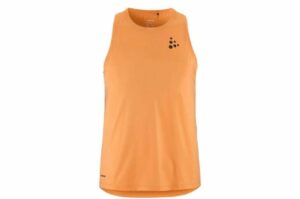Pickle juice stops muscle cramps
A unusual cure suggests that dehydration and electrolyte loss may not be the cause of muscle cramps after all.
No, really, this is a serious blog entry. There’s an article in the May issue of Medicine & Science in Sports & Exercise by researchers at Brigham Young University called “Reflex Inhibition of Electrically Induced Muscle Cramps in Hypohydrated Humans,” and that’s what it says:
The most significant and novel observation of this study was that ingesting small volumes (73.9 +/- 2.7 mL) of pickle juice alleviated electrically induced muscle cramps in mildly hypohydrated (3%) humans. Pickle juice required approximately 85 s to alleviate muscle cramps (cramp duration after ingestion ranged from 12 to 219 s). Although this was much longer than the purported claims of pickle juice’s efficacy, it still relieved a cramp 45% (85 vs 153 s) faster than when no fluid was consumed. In contrast, ingesting similar volumes of deionized water had no therapeutic effect on cramp duration (cramp duration after ingestion ranged from 71 to 246 s).
What’s interesting about this is not so much the promise of a “cure” for muscle cramps. (There are some reasons to think that downing a bunch of vinegar and salt probably isn’t a great habit, for one thing.) Instead, it’s how it stops cramps that is intriguing and suggests that conventional thinking on cramps may be mistaken.
The pickle juice cure has been around for at least a decade (it was described in a 2000 article in the Journal of Athletic Training), and most people assumed that it had something to do with all the electrolytes. But the authors of this new study aren’t convinced. First of all, the amount of electrolyte in 73 mL of pickle juice has a negligible effect on concentrations in the body. Second, the 85 seconds it took (on average) to relieve the cramps is far too short for the pickle juice to exit the stomach, be absorbed by the small intestines, and reach the relevant part of the body. Earlier studies have found that it takes at least 30 minutes for small volumes of pickle juice to leave the stomach.
Instead, the researchers suggest that the pickle juice acts on neural reflexes — a plausible suggestion, given that earlier experiments have found that vinegar can provoke reflexes and affect neurotransmitter levels. This fits with an alternate theory that cramps have nothing to do with dehydration or electrolyte loss, first proposed in the 1990s by Martin Schwellnus of the University of Cape Town:
Schwellnus et al. proposed that [cramps] were due to neuromuscular fatigue. Neuromuscular fatigue is thought to create an imbalance between muscle spindle and Golgi tendon organ activity, resulting in increased alpha motor neuron excitability. Thus, if [cramps] are caused by an imbalance between excitatory and inhibitory stimuli at the alpha motor neuron pool, pickle juice ingestion may cause an increase in inhibition from supraspinal sources, thereby resulting in cramp alleviation.
If you’re interested in the details of Schwellnus’s theory and the controversies surrounding muscle cramps, the Science of Sport blog did a good series on it back in 2007 (Part 1, Part 2, Part 3 and Part 4). It’s interesting stuff — and now, courtesy of pickle juice, there’s some new evidence.

